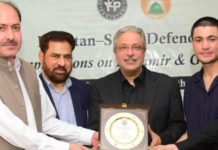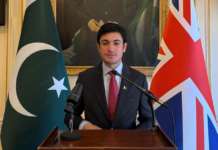Academic Legacy of Colonialism in Pakistan
“In the colonial context, the settler-only ends his work of breaking in the native when the latter admits loudly and intelligibly the supremacy of the white man’s value”, Frantz Fanon.
Similarly, the colonizers have left their marks on academic thinking and institutions of South
Asia. The South Asian nations, especially Pakistan and India, had also been trapped in their
colonial masters’ plan of choosing disciplines of studies.
The biggest problem our English masters faced was how to take control of the Indians’ minds. The colonial masters were aware of the lasting effects of authority over the brain instead of the human body. If you train a body, you control a person: if you train a mind, you control a nation.
By analogy, our British masters came here, suppressed our intelligence, and reined our land for almost a century. Though they have winded up their plans earlier at the end of the 1940s, yet we are witnessing the aftershocks.
The English masters required such individuals who could serve them socially and could run the pro-colonial state structure under their umbrella. Accordingly, they gave a notion of technical jobs based on serving people. In the same way, they tried their best to restrict people only to learn about technical professions like railways, irrigation, communications, medicines, and all other branches of engineering. The considerable mess of these mechanical and scientific subjects is to limit minds to the development of roads, railways, and other infrastructures. Hence, the society of Pakistan and India remains far away from social, moral, ethical, and educational development. Furthermore, the proud feeling of being modern, educated servicemen of the colonial master added salt to the injury.
Unfortunately, in the South Asian region, particularly Pakistan and India, it is common practice that parents of middle-class families set the goals for their children even before their birth. Their child would become a doctor or a civil, electrical, and software engineer to run the family. When their child lives up to that dream, they hardly secure a well-paid job. Consequently, the cream of society becomes the victims of unemployment as there is little effort on the part of the government to own these brains.
The British master did not introduce social sciences to Indians intentionally because, through these subjects, they themselves were ruling over India. If they had provided the same consciousness and intelligence to Indians regarding those subjects, they would have shot themselves in the foot. Additionally, the ruling master did not want to create their rivals in the corridor of power. Ultimately, the British conquered and retained the Indian territory through the job-seeker Indians.
In the same way, the aristocratic class, who has been at the driving seat of Pakistan since independence, followed the footsteps of the British master. They turned their deaf ear to the affairs of the middle-class and deliberately did not provide opportunities to the working class so that they also lead the nation. It is due to this fact that there is a wide gap in the education and mental approach of the elite class and the ordinary citizens. The majority of the ruling class are the students of social sciences, while the ruled community is comfortable by serving the people with natural sciences.
It is crystal clear that the natural sciences are the backbones of growth and development, but at the same time, the scarcity of social scientists is also problematic for the same progress and growth. The secret of the developed West and Europe lies in the core of their social development. These nations produce a large number of social activists, economists, sociologists, and political scientists. Their topmost universities like Cambridge and Oxford are mainly famous for the institutions of Arts and Social Sciences. It justifies the notion that they do not merely collect knowledge and information but also seek social progress on equal footing. On the other hand, according to the Higher Education Commission of Pakistan website, there are 217 varsities and only a few universities offer pure social sciences.
Your degree is just a piece of paper if it does not bring social and moral changes into your personality. Accordingly, medical and engineering students in Pakistan are commonly found ill-mannered and impolite because these students are rarely gone through the subjects of social sciences. Intolerance in youth is yet another product of not teaching social courses in most of the engineering and medical universities of Pakistan. Academic institutions do not pay attention to the decreasing level of tolerance in youth. Tolerance is patience, open-mindedness, acceptance of thoughts despite the difference of opinions, and giving respect to everyone irrespective of caste, color, religion, and language. Unluckily, new spirits generate new standards of respect and social status: they only think highly of the powerful and wealthy and ignore the noble and gentle.
In ancient India, social sciences like logic, history, law, and philosophy were considered the subjects of the ruling and noble class: as evidenced by the Gurukul and Buddha’s education system. Even in the Sufi education system, logic and philosophy remained the core disciplines.
Besides, history shows that the students of social sciences like law, philosophy, and political sciences challenged the colonial masters with their approach, thinking, and movements against colonialism. Towering personalities like Quaid e Azam Mohammad Ali Jinnah, Allama Iqbal, Liaqat Ali Khan, Jawaher Lal Nehru, and Subash Chandra Bose were the eminent social scientists who bring testimony to the fact. Similarly, the founding fathers of the United States of America, John Adams, Thomas Jefferson, and Benjamin Franklin, all were pupils of law, history, civics, and philosophy. They compel the Britishers to fled away from America. Martin Luther was another most influential social scientist in Western History. His writings were responsible for fractionalizing the Catholic Church and sparking the Protestant Reformation. His literary contributions are remembered in chapters of liberty and equality even today.
Pakistan needed social scientists mostly after 9/11. “War on Terrorism,” dented the soft image of Pakistan to a greater extent and Pakistan was unable to protect its culture, language, and religion. Due to a lack of social scientists, Pakistan could not make counter-doctrine to defend its national interests. Meanwhile, the West twisted and manipulated its agenda against terrorism, aiming to safeguard its greater interests in Pakistan and Central Asia.
First and foremost, to survive in the hybrid and proxy war of the twenty-first century, Pakistan must develop its own narratives, ideologies, and doctrines through social scientists to rebuild the soft image of Pakistan.
Secondly, it is the misfortune of Pakistan that its best of best youth goes abroad intending to seek jobs. In other words, Pakistan is facing a Brain drain. It is ironic that Pakistan first produces a job-seeking mentality and later keeps them unemployed. The state of Pakistan must generate financial and psychological attractions for the students in the subjects of social sciences Thirdly, the new generation has to change their job-seeking mindset to develop job-producing mindsets. They have to leave the colonial imposition of preferring natural sciences from the perspective of jobs. Similarly, they must not feel a sense of inferiority for social sciences anymore. For this purpose, Pakistan has to establish more universities of social sciences and train its coming generation for social development. Finally, the next age must back off from the colonial mindset, and if not so, they will be ruled by the same elite class that has been in power in almost every government.
Academic Legacy of Colonialism in Pakistan
By Aqib Javed. The writer is a graduate in BS (Hons) English and currently, student of MA IR.





I’m fairly certain, Captain, she said, that the more you discover about me, the more you will dislike me. Therefore, let’s cut to the chase and acknowledge that we don’t like each other. Then we won’t have to bother with the in-between part. She was so bloody frank and practical about the whole thing that Christopher couldn’t help but be amused. I’m afraid I can’t oblige you. Why not? Because when you said that just now, I found myself starting to like you. You’ll recover, she said. Her decisive tone made him want to smile. It’s getting worse, actually, he told her. Now I’m absolutely convinced that I like you. Beatrix gave him a patently skeptical stare. What about my hedgehog? Do you like her, too? Christopher considered that. Affection for rodents can’t be rushed. Medusa isn’t a rodent. She’s an erinaceid. erodate.us